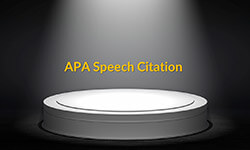
Providing proper credit and avoiding plagiarism is essential when writing academic papers. Citing sources correctly is crucial in academic writing to effectively convey your arguments and keep up academic integrity. This article offers a comprehensive guide to APA speech citations, which includes definitions, how to format an APA speech citation with examples, and answers to frequently asked questions.
Definition: APA speech citation
APA speech citation is a reference to a speech, lecture, or public address that you’ve used as a source in your research paper. It follows the guidelines established by the American Psychological Association (APA) for citing sources in academic papers.
You can take a look at an overview of all our APA examples in this article.
in Your Thesis
In-text citation
According to the APA style, when you’re citing a speech in-text, you should include the:
- Speaker’s last name
- Year of the speech
If you’re directly quoting the speech, you also include the timestamp in minutes and seconds.
Reference entry
When you’re citing a speech in the reference list at the end of your paper, you should include the:
- Speaker’s name
- Speech’s year
- Title (if any)
- Location
- Date
Here’s the general format:
(Speaker’s Last name, Year, Timestamp)
Here’s the general format:
Speaker’s Last name, First initials. (Year, Month Day). Title of speech [Type of speech]. Location.
Examples of APA speech citation
Let’s illustrate the APA speech citation with a hypothetical example.
FAQs
If the speech doesn’t have a specific title, you can describe the speech in square brackets.
For instance, [Inaugural address].
If the speech is from a recorded source like YouTube, include the URL in the citation.
Yes, you can. If the speech is not retrievable by the reader (e.g., a private lecture or a keynote address), you’d consider it as “personal communication,” which is cited in-text but not in the reference list.
